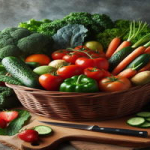dolbadod profilja

- Statisztika
- 0 hozzászólást írt
- 0 témát indított
- 0 véleményt írt
- 0 cikket írt
- 0 barátja van
- 0 szavazatot kapott
- Csatlakozott
- 2024. március 14.
- Csoport
- Tag
- Titulus
- új tag
dolbadod még nem állította be a státuszát

Mi újság nála?
2024.03.14. 16:04dolbadod új képeket töltött fel a fotóalbumába.
Bemutatkozás
Saving Organic Food: An Informational
In recent years, there has been a growing awareness of the importance of organic food, both for our health and the environment. Organic food refers to produce and other agricultural products that are grown without the use of synthetic pesticides, fertilizers, genetically modified organisms (GMOs), or ionizing radiation. Instead, organic farming relies on natural methods like crop rotation, composting, and biological pest control to maintain soil fertility and control pests and diseases.
The movement towards organic food is driven by several factors, including concerns about the health effects of chemical residues in conventionally grown produce, the environmental impacts of industrial agriculture, and the desire to support more sustainable farming practices. In this essay, we will explore the reasons why saving organic food is essential and how it can benefit both individuals and the planet.
1. Health Benefits:
One of the primary reasons people choose organic food is for its perceived health benefits. Organic produce is grown without synthetic pesticides and fertilizers, which means that it is less likely to contain harmful residues that can accumulate in the body over time. Studies have shown that organic food may have higher levels of certain nutrients, such as antioxidants and omega-3 fatty acids, compared to conventionally grown produce. Additionally, organic farming practices promote soil health, which can lead to higher nutrient levels in the food grown in organic systems.
2. Environmental Sustainability:
Industrial agriculture, with its heavy use of chemical inputs and monoculture cropping systems, has had devastating effects on the environment. Pesticide runoff contaminates waterways, synthetic fertilizers contribute to soil degradation and erosion, and the loss of biodiversity threatens ecosystems worldwide. Organic farming offers a more sustainable alternative by working with nature rather than against it. By avoiding synthetic inputs and promoting biodiversity, organic farmers help to conserve soil and water resources, protect wildlife habitat, and reduce greenhouse gas emissions.
3. Supporting Small-scale Farmers:
The shift towards organic food also has social implications, particularly for small-scale farmers. Organic farming tends to be more labor-intensive and requires a deeper understanding of ecological processes, which can make it more accessible to smaller, family-owned farms. By supporting organic agriculture, consumers can help to create economic opportunities for local farmers and contribute to the revitalization of rural communities. Additionally, buying organic food often means buying from local sources, which reduces the carbon footprint associated with transporting food long distances.
4. Preserving Genetic Diversity:
Another critical aspect of organic farming is its emphasis on preserving genetic diversity in our food supply. Conventional agriculture has led to the widespread adoption of a few high-yielding crop varieties, often at the expense of traditional and heirloom varieties that may have valuable traits like disease resistance or drought tolerance. Organic farmers prioritize seed saving and the use of heirloom and open-pollinated varieties, helping to safeguard genetic diversity and resilience in our food system.
5. Consumer Awareness and Education:
Finally, saving organic food requires consumer awareness and education about the benefits of organic farming and the importance of supporting organic producers. By making informed choices about the food we eat, we can vote with our wallets and support agricultural practices that align with our values and priorities. This may involve seeking out organic options at the grocery store, joining a community-supported agriculture (CSA) program, or growing our own food using organic methods.
Organic Food Without the Price Tag: You Bet!
Finding Organic Food Suppliers That Support the Environment
How to Find Reputable Organic Food Suppliers
Finding Wholesale Organic Food Suppliers That Offer Biolinked Technology
Quality Products at Reasonable Prices
How to Choose a Date From Fruit Suppliers
Choosing Organic Food Suppliers
Finding a Source for Organic Food Suppliers
In conclusion, saving organic food is essential for promoting human health, protecting the environment, supporting local economies, preserving genetic diversity, and empowering consumers to make informed choices about the food they eat. By embracing organic farming practices and supporting organic producers, we can work towards a more sustainable and resilient food system for future generations.
Randomképek

Üzenőfal
dolbadod Üdvözöljük Üzletünkben!
2024.03.19. 09:09

